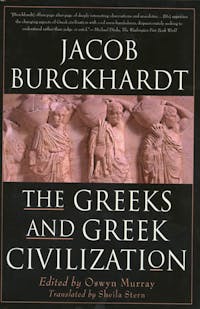The Greeks and Greek Civilization
 Download image
Download image
ISBN10: 0312244479
ISBN13: 9780312244477
Trade Paperback
504 Pages
$30.99
CA$43.50
The Swiss scholar Jacob Burckhardt (1818-97) is well known as the author of The Civilization of the Renaissance in Italy, which has remained in print since its publication in 1860. He is far less well known for his pioneering studies in ancient Greek history, which were an important influence on his most celebrated student, Friedrich Nietzsche, and which shaped the modernist view of Greek civilization not as an expression of the heights of human reason, but as an irrational and often dangerous construct. Burckhardt believed that the ancient Greeks' myth-laden view of their own past, full of sociopathic heroes and tragic victims, was an expression of this state of unreason: "The wildest variations and contradictions," he writes, "were not found at all disturbing."
Even less disturbing to the Greeks, he continues, was the systematic violence—and even human sacrifice—that erupted when a city like Athens wished to extend its territory or when a leader wished to extend his power. That violence, Burckhardt holds, was a natural result of the ancient Greeks' pursuit of honor, which accrued by facing and defeating danger. One such danger was the mere act of standing out in any way whatever, which could net a would-be hero a charge of being impious—witness, Burckhardt notes, the fates of Socrates and his contemporary Alcibiades. Drawing from examples of mythology, tragedy, oratory, and comedy, Burckhardt touches on themes such as Greek society's contempt for women and its apparent readiness to embrace all sorts of antidemocratic demagoguery—in the person, for instance, of the famed hero Lysander, who "combines depravity with natural gifts in a way that was typically Spartan and yet generally Greek." Burckhardt's deconstruction of classical history, ably edited by Oxford historian Oswyn Murray, reads as if it were written in our own time.
Reviews
Praise for The Greeks and Greek Civilization
"[Burckhardt] offers page after page of deeply interesting observations and anecdotes . . . [He] appraises the changing aspects of Greek civilization with cool even-handedness, dispassionately seeking to understand rather than judge or extol."—Michael Dirda, The Washington Post Book World
"Burckhardt's was one of the most profound and original historical minds that ever existed. This reconstruction of his work on ancient Greece is a wonderful contribution to our wisdom and knowledge."—Robert Conquest, author of The Harvest of Sorrow
"Not only a rich overview of Burckhardt's learning but a precious glimpse into the intellectual world of the late nineteenth century."—The New Yorker
"This book will become a necessary tool in courses not only on 19th-century historiography, but on the ancient world as well."—Publishers Weekly
"Jacob Burckhardt, once regarded only as a historian of art, [is] now recognized, thanks to his posthumously published lecture notes and correspondence, as one of the profoundest of historians."—Hugh Trevor-Roper, author of The Rise of Christian Europe
"Lively . . . A corrective to the rather gaga idealism of 'the Greek spirit.'"—George Wills, The New York Times Book Review
"Burckhardt's lively intelligence and massive learning create ideas that shoot off the page like fireworks."—The Sunday Telegraph (London)


